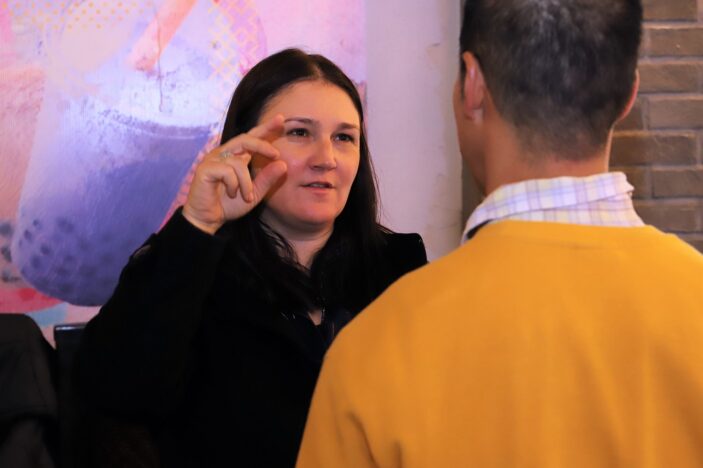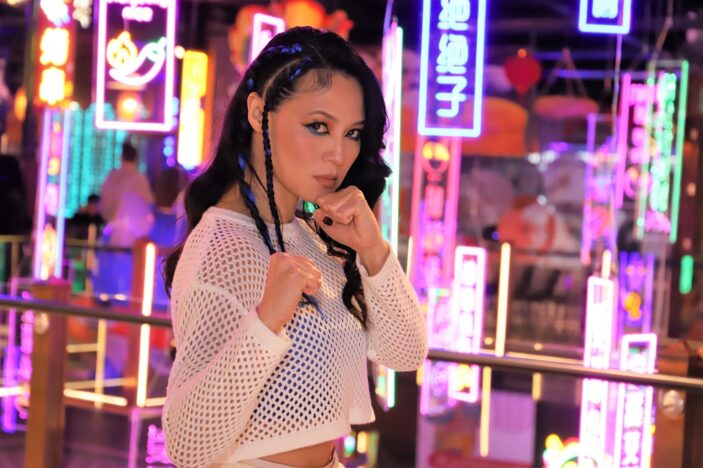
The story of two generations of warring families in Sydney’s West, Suka is a violent love story…with a twist. Brought together by fate, but pulled apart by family, this genre-bending romantic action film marks the feature debut of Australian filmmaker Heidi Lee Douglas.
Ahead of the film’s release this week on DVD and Digital, Peter Gray spoke with the documentarian-turned-politician-turned genre maestro about weaving her own personal experiences into the storytelling, why this story was her debut foray into features, and what she turned to for inspiration.
When I first heard the film, the Romeo & Juliet-type narrative was what initially seemed to be one of the main throughlines, but in further researching I read how you took inspiration from your own encounters with gang-related incidences in West Sydney. Was Tsu Shan Chambers and Lily Cheng’s script written with you already involved? Or was your influence added more after the fact?
Well, we’re co-creators. So the way the project worked is that Tsu Shan was looking for a writer and a director to work with her in the early stages of her development. I was introduced to Tsu Shan through a female directors group that I was running at the time. I had made two horror shorts, and they had done very well on the festival circuit, and I’d written my own genre feature. I was speaking to female horror directors in the “coven” of horror, from North America, (and) they were getting themselves attached to direct (films) because writing takes a really long time.
I was quite keen to write my own stuff, but also just direct other people’s work, and so I actually got attached to three different projects at that period of time. Tsu Shan’s was one of them. I came on board because she’d done a project called The Wild Orchards, and it was a very low budget web series (but) the best thing about it was the action sequences. They were like Crouching Tiger, Hidden Dragon, which is a really favourite film of mine. I love the strong female protagonists (in that) and how the world was created. I love Kill Bill too. I love the kick ass protagonists in their jumpsuits, and that kind of humour that led throughout that film. So when Tsu Shan was looking for a director… I had done some action sequences in Devil Woman, which was my short, and they were quite challenging to direct, and it was the first time I had worked with a stunt coordinator, so it was something I wanted to improve on. It was a muscle I wanted to flex more.
And the fact that (Suka) was an Asian-Australian story was important to me, also, because I spent a lot of time growing up in Asia, and I feel like we don’t really locate Australia as part of Asia. I know Paul Keating started that phenomenon in Australia, but I really saw geographically around Australia that we are a part of Asia. Much more than North America or Europe. And now living in Sydney it’s just amazing that 59% of where I live has English as a second language, so it’s a very rich, multicultural community. And we don’t see that reflected on screen. That was a reason I was excited that Tsu Shan was wanting to make this kind of story, and I wanted to support her.
So, Lily, Tsu Shan and I, for five years basically, worked on the script together. It took different twists and turns in that time. It originally started out as a TV series script. Then it became an interactive web series, which is also another offering that we’re releasing, and then towards the end (of writing) it got some interest as a feature. So when we went to shoot it, the director of photography and I made sure we shot it as a feature. We weren’t thinking web series. In our heads this was a feature film. The script wasn’t necessarily written as a feature script, so we ended up having to do some pickup shoots to round out the whole story, because when you write something as a cliffhanger, you can answer a lot of questions in episodes 2 and 3 if this was a 60 minute episode, but as an 80 minute feature, you have to have a satisfying narrative. We realised this in post-production and did a few pick-ups to round it out. That’s how it became a feature, basically.

As you mentioned that action was something you wanted to explore, was that one of the main reasons you took this on? Because you had success with horror, did you ever think of tackling that genre for your debut feature? Or was it challenging yourself and doing something completely different that appealed more?
The other two projects I was attached to were both horror. One was a possession-domestic violence horror (movie). It was quite dark. The other was a more high-end fashion splatter movie. So I was looking at things that were across the genre range, and I knew worked well for audiences – particularly in North America, where my (short) films were well received. We don’t do genre in Australia. I went to Fantastic Fest, which was my first genre festival, and I didn’t know about it when I made my genre film. It’s this whole sub-culture, and I think in Australia we aren’t tapped into that so much. Even the funding bodies don’t really understand how big the market is.
Learning that “Suka” means love in Malay and bitch in Russian, it makes so much sense as they are so at odds with one another, and I feel like this film has that balance of light and darkness to it. Apart from your own experiences, and Crouching Tiger… and Kill Bill that you previous mentioned, was there any other major filmic inspirations when you went to shoot?
By the time we went to shoot I was deep diving into specific genre to look for things that fit this world. If you’re working on an action film, you start watching action films. You deep dive into that thing you love. One of the projects that one of the inspirations (for Suka) was a series called My Name, which is on Netflix. It’s a Korean TV series, and it’s got a really strong female protagonist, lots of fight sequences, amazing character arcs, and it’s set in this gangster world, basically. I love the colorization (of the show). They use lots of reds and greens. And there was another film called One Night in Paradise, which is another South Korean gangster film, which has this really amazing characterization in this violent gangster world, so we took that as inspiration.
This film really delights in showcasing physicality. How much of a challenge did that prove? I understand this was shot in 3 weeks, or something? That makes it that much more insanely impressive! When you’ve got all these action sequences, and you have to get the actors action-ready. How much of a challenge is that to get to that point in that amount of time?
Tsu Shan gave the number of shoot days we had to work with, and she allocated time for rehearsals, which was about five days for fight rehearsals with Blake Wells, our fight coordinator. Unfortunately I had COVID so I couldn’t be there, but I came in right at the end and watched what they had prepared. We created the time for them to build the chemistry in terms of fighting, and to practice some of the techniques. But we also cast people who had experience in action as well. That was part of the casting process: Acting chops and fighting chops!
Suka is available on DVD and Digital for rent or purchase from October 4th, 2023, through Umbrella Entertainment.
